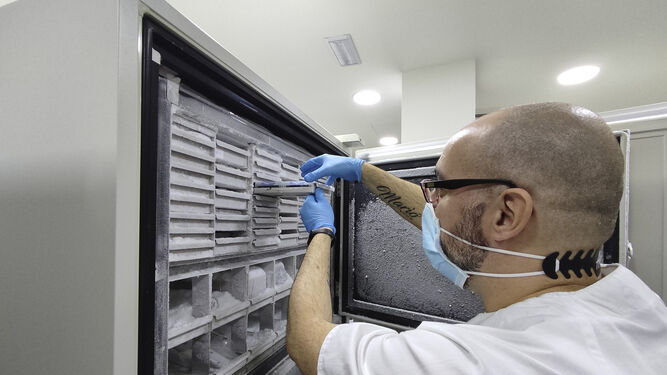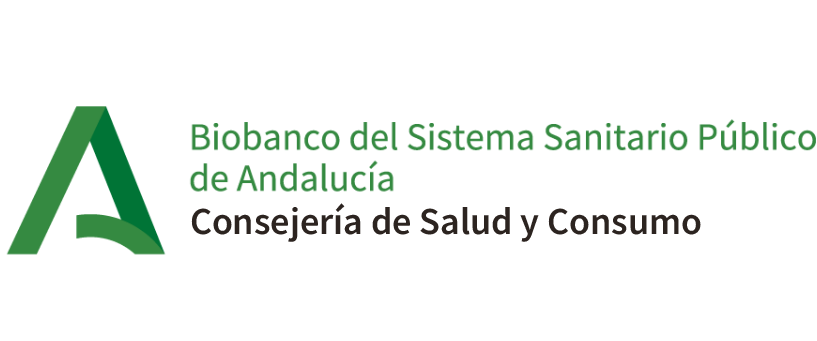The Sevillian legacy of the coronavirus

The Virgen Macarena Hospital biobank stores more than 10,400 biological samples from patients with Covid-19 that provide key information for research on the disease.
Trying to delve deeper into how the coronavirus affects those affected, what effects it causes in the long term, the common and differentiating characteristics between the most and least infected, or how the different patient profiles respond to drugs and the first vaccines, are just a few. of the unknowns that, faced with a pathology never seen before, doctors continue to ponder almost two years after the first infections. Although treating them comes first, at the Virgen Macarena Hospital they saw from the beginning that facing an unknown evil required gathering and organizing all the information about each of the coronavirus victims. A Sevillian legacy of the pandemic that is made up of thousands of human samples through which the first answers are beginning to be obtained.
In a building attached to the hospital, next to the Emergency Service, and in a large freezer with a temperature of 80 degrees below zero, rests part of the mark that the coronavirus pandemic has left in the Virgen Macarena health area and which is guarded by the team. of work coordinated by Dr. María Isabel García . Specifically, biological material derived from blood, mostly such as plasma or serum, but also urine, cell extraction and tissues.
The Biobank node laboratory of the Macarena Hospital guards more than 10,400 samples that belong to some 318 Sevillians affected by the disease caused by SARS-CoV-2 and who have decided to donate them for research. From mild patients and other more serious ones , extracted at different stages of the disease, from when they were treated in the hospital emergency room with the first symptoms, until they were admitted or returned home. A fundamental raw material, in any case, that serves researchers to generate knowledge about the causes, mechanisms and possible treatments of the ailment that has put the entire planet in check.
"For us, the pandemic has been an opportunity, a great challenge, and a shock for science , and in particular, for biomedicine, but also a problem. Although from the beginning we saw that it was very interesting not to lose these samples, the power Organizing everything to be able to collect them with the greatest safety required a great effort. But we got into that role and the hospital has always taken us into account, including us in their PPE and vaccination protocols so that everything went well," explains the hospital coordinator. Virgen Macarena hospital biobank, María Isabel García, who emphasizes that it is a service that works in a network throughout Andalusia, dependent on the Biobank of the Andalusian Public Health System , within, in turn, a provincial node whose director is Dr. Enrique from Álava.
The coordinator of the Sevillian Biobank at Macarena explains that the samples began to be collected in mid-May 2020 and that there are three circuits that have been generated to offer patients the possibility of donating them to the Biobank for research purposes with the collaboration of the Pulmonology, Neurology, Emergencies, Infectious Diseases and Nephrology units.
In this way, the bioresources currently preserved by the hospital's Biobank correspond to a cohort of donors being followed up after SARS-CoV-2 infection, in this case through Pulmonology ; a strategic cohort of hospitalized patients with active Covid-19 disease at the time of donation and a follow-up at 24 hours, three days and seven, in coordination with the Infectious Diseases service; and, in addition, another group of samples donated by health workers who have had the disease and who were subjected to the serology that the Andalusian Health Service (SAS) carried out on the staff in the Emergency services in this center, and from the Samples were also collected for further investigation.
"A very interesting variability that is giving very good results. Right now there are a large number of projects underway that are not only using this type of samples, but other specific circuits are also being generated for more specific projects. related to genetics or vaccination and that are very interesting," emphasizes Dr. García Sánchez.
To donate samples to the Biobank, donors must authorize their samples to be used by signing an informed consent in which the reason for the donation and the use that will be given to those samples and the data are explained. associated clinicians. Consent for the storage of samples in the Biobank and their use is voluntary and the selection of patients who become donors is directed directly by the responsible clinicians at the center of the specific research projects who are the ones determine the necessary profiles.
Currently, with part of the bioresources obtained through the sample collection circuits in the Macarena, requests from several funded research projects, of a regional, national and European nature, are being attended to, for which it is planned to leave this node of the order. of 2,000 or 3,000 units between all of them.
The coordinator of the Sevillian Biobank thus details the donation of samples for the research project on precision medicine, of Andalusian origin, and coordinated by doctors Joaquín Dopazo and Manuel Romero in which genetic markers of the disease are being studied in order to be able know in the future what type of treatments are better than others.
On the other hand, through the Spanish Association of Nephrology , with Dr. Mercedes Salgueiro as a reference, the samples collected by the Macarena Biobank are part of a national project in which they are working on the immunity of fragile patients who have chronic kidney disease, transplant or dialysis. "Specifically, we are seeing the protective capacity offered by vaccines and to do so, samples are collected from patients who have been vaccinated and their immunization history is seen. We have 53 samples collected and work on it is already beginning," he clarifies. the doctor.
Finally, at the European level, the Orchestra project , which is organizing observational studies on Covid of which Virgen Macarena is one of the three Spanish partners and leader in work packets, with Dr. Jesús Rodríguez Baño as coordinator. These are not clinical trials but very complete follow-up studies of Covid patients that try to see what pathology and immunology substrate these patients have over time; also in vaccinated patients or especially in fragile patients, in whom it is studied whether they develop antibodies, side effects, what that disease is like, and also in the long term.
Sample routes: from the patient to the research project
Becoming a donor of biological samples involves completing a questionnaire and undergoing a series of basic clinical tests. But, in addition, they are requested authorization to donate blood, urine and surplus diagnostic tissue samples to the hospital's Biobank, and their use in subsequent research projects. The extraction of the liquid samples is carried out by the nursing staff, who uses the collection kits carefully prepared by the Biobank laboratory technicians, with the peculiarity that in Covid patients the tubes will be completely sealed to prevent leaks with a screw cap . The quantity ranges between 0.5 milliliters and 0.3. The samples are then collected by the Biobank staff, where they are recorded, coded, processed and stored under strict conditions of confidentiality and quality waiting to be requested for research projects. Their release also requires laborious work of documentation and location of the requested bioresources, as well as exhaustive conservation control of them until they are sent to the project where they will form part of the advances of science.

